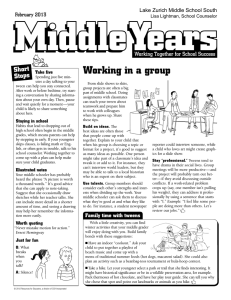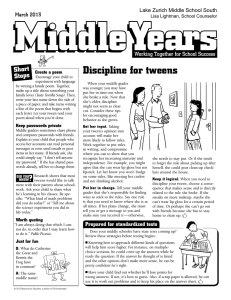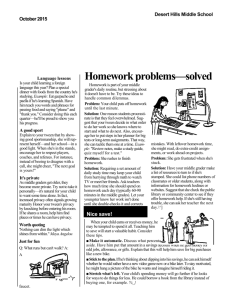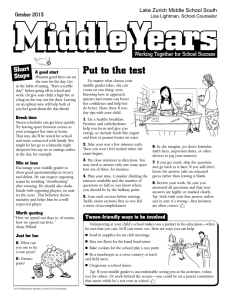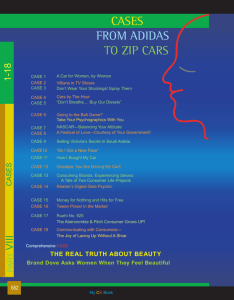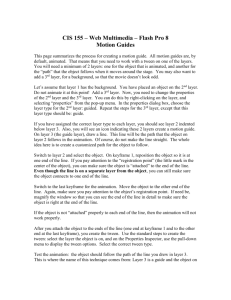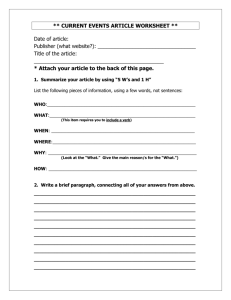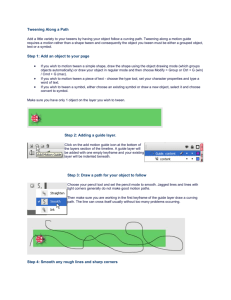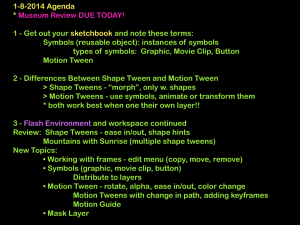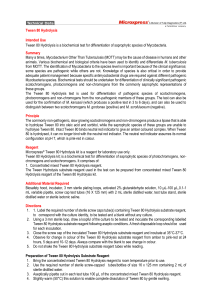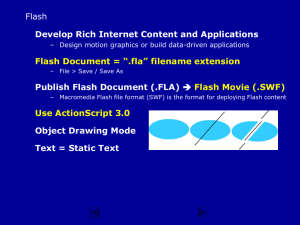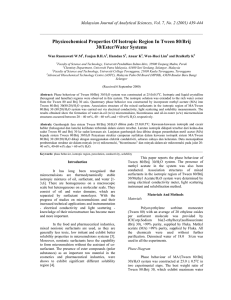A healthy social life November 2013 Sharpen your memory
advertisement
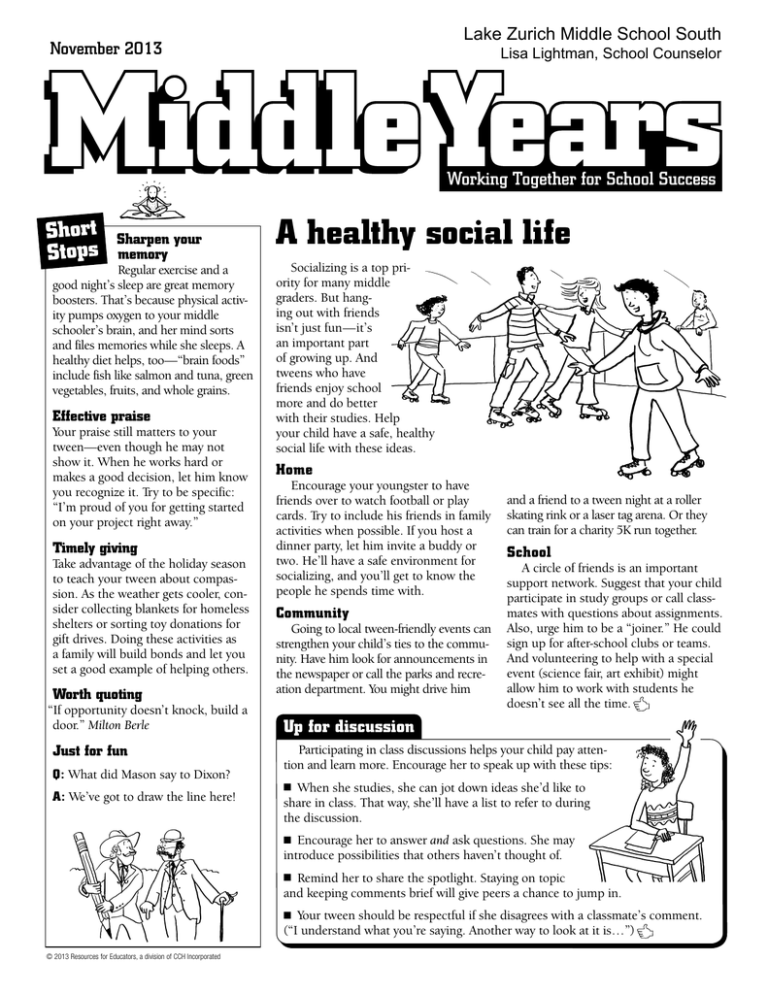
Lake Zurich Middle School South November 2013 Short Stops Sharpen your memory Regular exercise and a good night’s sleep are great memory boosters. That’s because physical activity pumps oxygen to your middle schooler’s brain, and her mind sorts and files memories while she sleeps. A healthy diet helps, too—“brain foods” include fish like salmon and tuna, green vegetables, fruits, and whole grains. Effective praise Your praise still matters to your tween—even though he may not show it. When he works hard or makes a good decision, let him know you recognize it. Try to be specific: “I’m proud of you for getting started on your project right away.” Timely giving Take advantage of the holiday season to teach your tween about compassion. As the weather gets cooler, consider collecting blankets for homeless shelters or sorting toy donations for gift drives. Doing these activities as a family will build bonds and let you set a good example of helping others. Worth quoting “If opportunity doesn’t knock, build a door.” Milton Berle Just for fun Q: What did Mason say to Dixon? A: We’ve got to draw the line here! Lisa Lightman, School Counselor A healthy social life Socializing is a top priority for many middle graders. But hanging out with friends isn’t just fun — it’s an important part of growing up. And tweens who have friends enjoy school more and do better with their studies. Help your child have a safe, healthy social life with these ideas. Home Encourage your youngster to have friends over to watch football or play cards. Try to include his friends in family activities when possible. If you host a dinner party, let him invite a buddy or two. He’ll have a safe environment for socializing, and you’ll get to know the people he spends time with. Community Going to local tween-friendly events can strengthen your child’s ties to the community. Have him look for announcements in the newspaper or call the parks and recreation department. You might drive him and a friend to a tween night at a roller skating rink or a laser tag arena. Or they can train for a charity 5K run together. School A circle of friends is an important support network. Suggest that your child participate in study groups or call classmates with questions about assignments. Also, urge him to be a “joiner.” He could sign up for after-school clubs or teams. And volunteering to help with a special event (science fair, art exhibit) might allow him to work with students he doesn’t see all the time. Up for discussion Participating in class discussions helps your child pay attention and learn more. Encourage her to speak up with these tips: ■ When she studies, she can jot down ideas she’d like to share in class. That way, she’ll have a list to refer to during the discussion. ■ Encourage her to answer and ask questions. She may introduce possibilities that others haven’t thought of. ■ Remind her to share the spotlight. Staying on topic and keeping comments brief will give peers a chance to jump in. ■ Your tween should be respectful if she disagrees with a classmate’s comment. (“I understand what you’re saying. Another way to look at it is…”) © 2013 Resources for Educators, a division of CCH Incorporated Middle Years November 2013 • Page 2 Have her pick a favorite song. She can use a timer to see what percentage of the song the chorus takes up. She’ll probably find it’s a large portion — and that’s why the chorus is so easy to remember! Make math matter Does math appeal to your tween? If not, it could be because she doesn’t see how it relates to the real world. These activities will show her how numbers are part of everyday life. Listen to music. Ask your child if she knows why the chorus of a song sticks in her head. Then, suggest that she find out by exploring the relationship between math and music. Q Creative minds Calculate food prices. Restaurants use math to determine how much to charge customers. Many places triple food costs to cover expenses and turn a profit. When you dine out, have your youngster determine the cost of the food (the menu price divided by 3). At home, she could calculate your meal costs by adding up the ingredient prices and dividing by the number of servings. If she ran a restaurant, how much would she need to charge to make a profit? & I’ve heard that creative thinkers are in demand in the workforce today. How could I encourage my son to use his creative side? A You’re right — companies want workers who can think creatively to come up with fresh solutions. When you face an everyday problem, ask your tween to help you solve it. For instance, have him suggest several ways to rearrange your schedule so you’re able to fit in all of your commitments. Or if you don’t have an item that you need, tell him to look around for a different object that would work in its place. A rubber band could keep a snack bag closed without a “chip clip,” for example. If your son is working on a school project, encourage him to think of a fresh idea or angle for his presentation. For instance, he might build a mobile or write a newscast. Using creativity in this way will help his project stand out and give him good training for the future. O U R P U R P O S E To provide busy parents with practical ideas that promote school success, parent involvement, and more effective parenting. Resources for Educators, a division of CCH Incorporated 128 N. Royal Avenue • Front Royal, VA 22630 540-636-4280 • rfecustomer@wolterskluwer.com www.rfeonline.com ISSN 1540-5540 © 2013 Resources for Educators, a division of CCH Incorporated Winning conferences A parent-teacher conference gives you a chance to find out how your middle grader is doing and to connect with his school. Consider these suggestions. 1. Set a positive tone. Let teachers know you look forward to working with them to help your child succeed. to do as 2. Ask about the curriculum. Find out what your tween should be able what he of aware being By have. he’ll s project of kinds the year unfolds and what track. on him keep to try should focus on, you can s, or 3. Share information. Maybe your child learns best through hands-on activitie things these about Talking perhaps your family is going through a difficult time. him. will put you and his teachers on the same page and help them work with in 4. Focus on solutions. If the teachers mention problems (too much talking s teacher the what r discove You’ll ions. suggest for ask class, falling test scores), t. suppor provide can you plan to try, as well as ways Parent High-tech cheating to daughter Gina told consequences are the same, too: you get Parent meMy a zero—and you don’t learn the material. her friend got caught cheating in science class. During a quiz, Kendra had her phone in her lap and was reading notes she had texted to herself. I hadn’t heard of this type of cheating before, but I explained that looking at answers in your own text is just as wrong as looking at someone else’s paper. The Gina mentioned that her friend felt pressure to get As. So I told my daughter that if she also feels too much pressure or is struggling, she can come to me, and we’ll figure out how to get help. I also said I prefer that she earn a low grade honestly rather than get any other grade by cheating.
